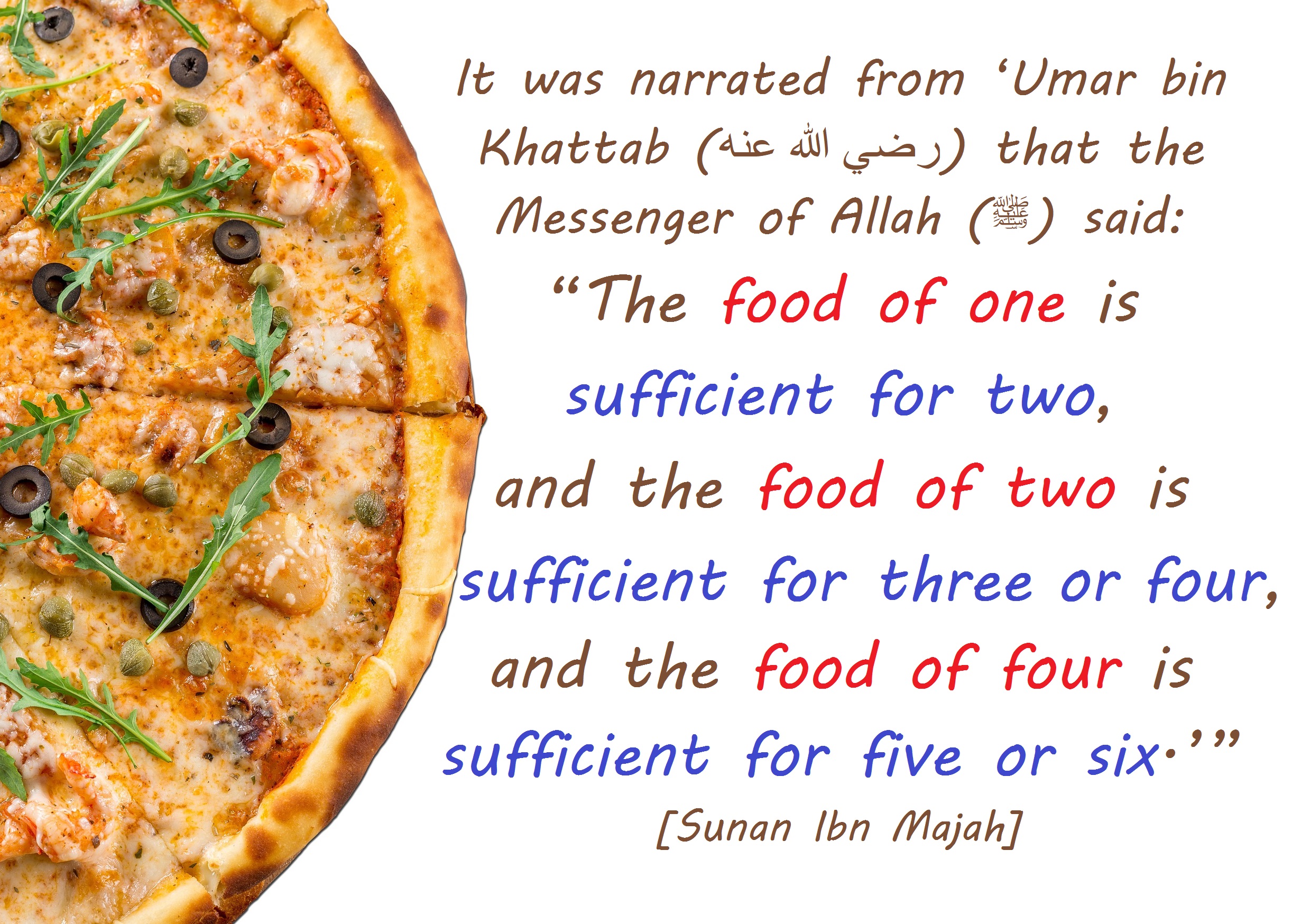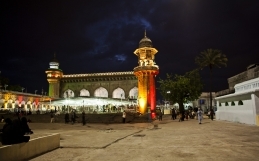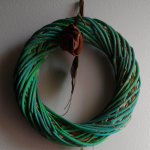بِسْمِ اللَّهِ الرَّحْمَـٰنِ الرَّحِيمِ
Allah has blessed us with our beloved month of Ramadan. This is when all the healthy Muslims are obliged to fast. In this month, we pray more, spend more time in masjid, give more charity and are most kind to others. We also savour many traditional and yummy dishes. Of course, we spend a little more time and money on food. What are you craving for? By now you should at least once tried your favourite fries. Is it samosa, spring roll or pakora? Some of us should have started with healthy salads and fruits. Most of us would have relished the traditional Ramadan soups and broths – Harees, Haleem, Kanchi or so. When we are hungry, we do tend to buy or cook a little more. 😊 Our tables are adorned with colourful desserts and savoury delicacies as we wait impatiently to hear the call to break the fast.
Unfortunately, this is the month we are also the most wasteful! How do we leave our glorious tables after our meals? What happens to the left-over salads, fries and drinks? If our bins could express themselves, they would cry and complain about the burden they carry in the month of Ramadan. Astaghfirullah.
We are an ummah who takes pride in following our beloved prophet. Do we follow the modern day ethics and refrain from completing our drink? Our prophet used to even lick his fingers after his meal! May our plates and spoon look as good as clean ones once we’ve eaten our food.
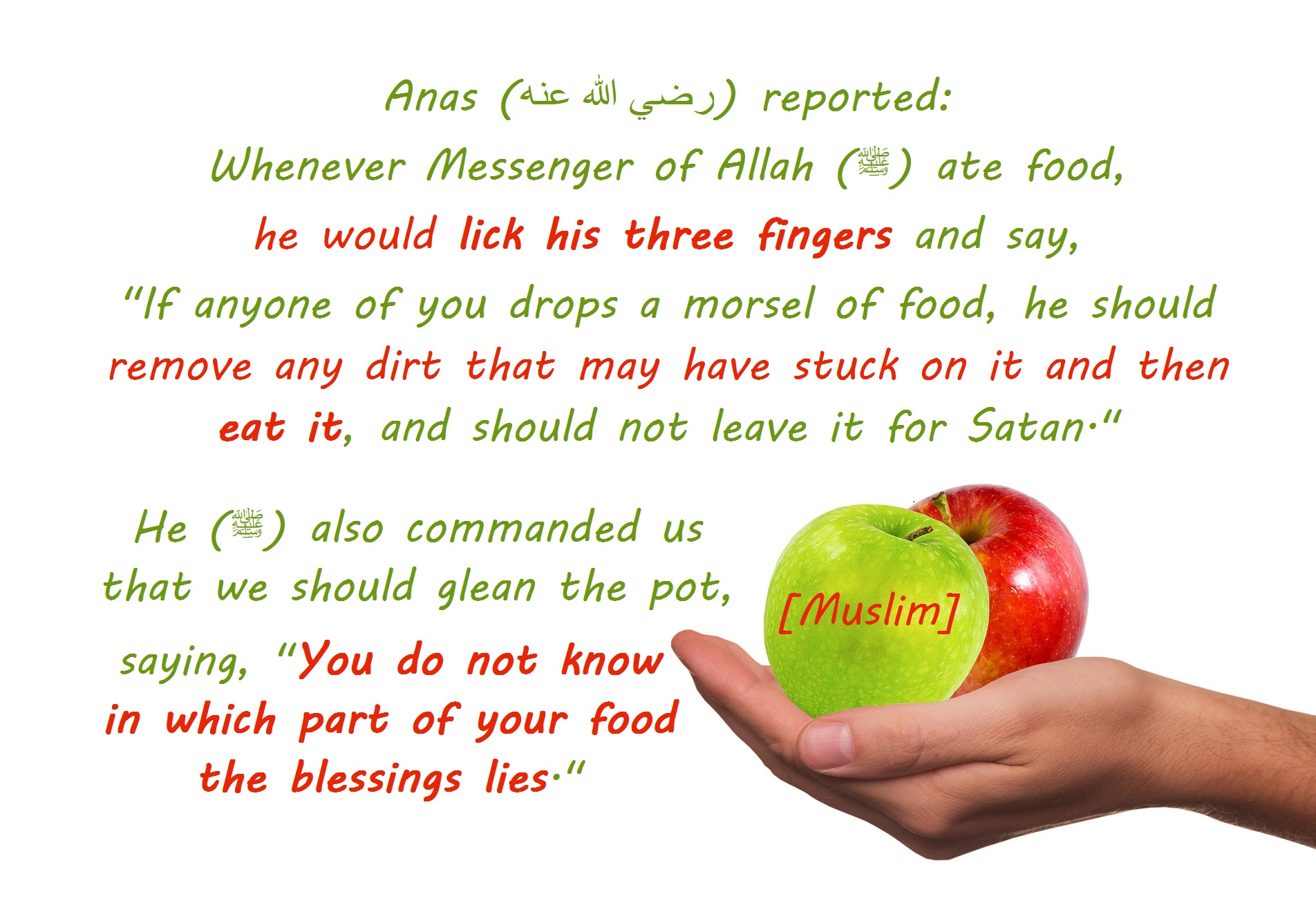
Food is a blessing from Allah. Nowadays we can relish unseasonal fruits and vegetables from different parts of the world without even stepping out of our home. Online shopping is easy. But growing the greens was not easy. Our exotic dishes and drinks wouldn’t exist without the hard work of thousands of peoples – farmers, traders, exporters, porters and so on. In a way, we eat far better than even kings and queens of the past. Be grateful for the food on your plate. Throwing food is proof of being ungrateful to Allah.
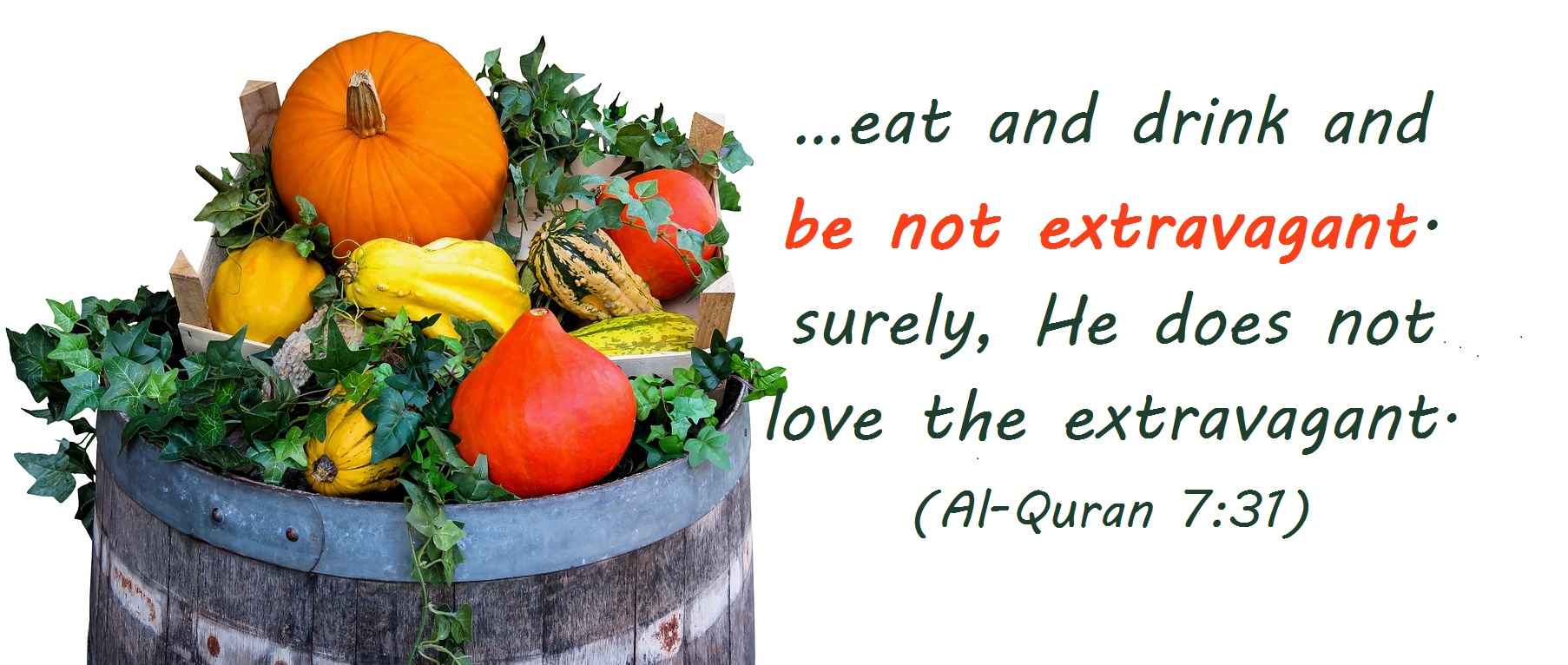
…eat and drink and be not extravagant. surely, He does not love the extravagant. Surah al-A’araaf 7:31.
Before we break our fast, we ensure that we supplicate to Allah to bless us in this world and in the hereafter. What about the blessings which The most Merciful had blessed us? If we are really grateful for the food on our plate, we’ll value it and not waste it. Here are some of the tips to prevent food wastage.
Cook as much as it is necessary:
Learn how much food your family actually needs. Cook as much as it is necessary. Nothing more. Especially when it comes to fries or other rich delicacies cook by numbers. Ask children to start iftar with dates, fruits and traditional soups. Show them how to eat healthily. Keep uncut fruits and bread handy. This may mostly save us from hustles of saving and reusing food. Plus, we’ll eat a balanced healthy meal for iftar ensuring that we don’t feel sluggish after a meal. If you are really craving for more fries, you could always fry and eat a few more fries after maghrib salah.
Keep it simple:
Indeed, for a fasting person iftar meal is one of the two promised delights (other being the reward in the hereafter). This doesn’t mean that the iftar table has to be filed with the different varieties of food. Remember our honourable prophet lived for months together on just dates and water!
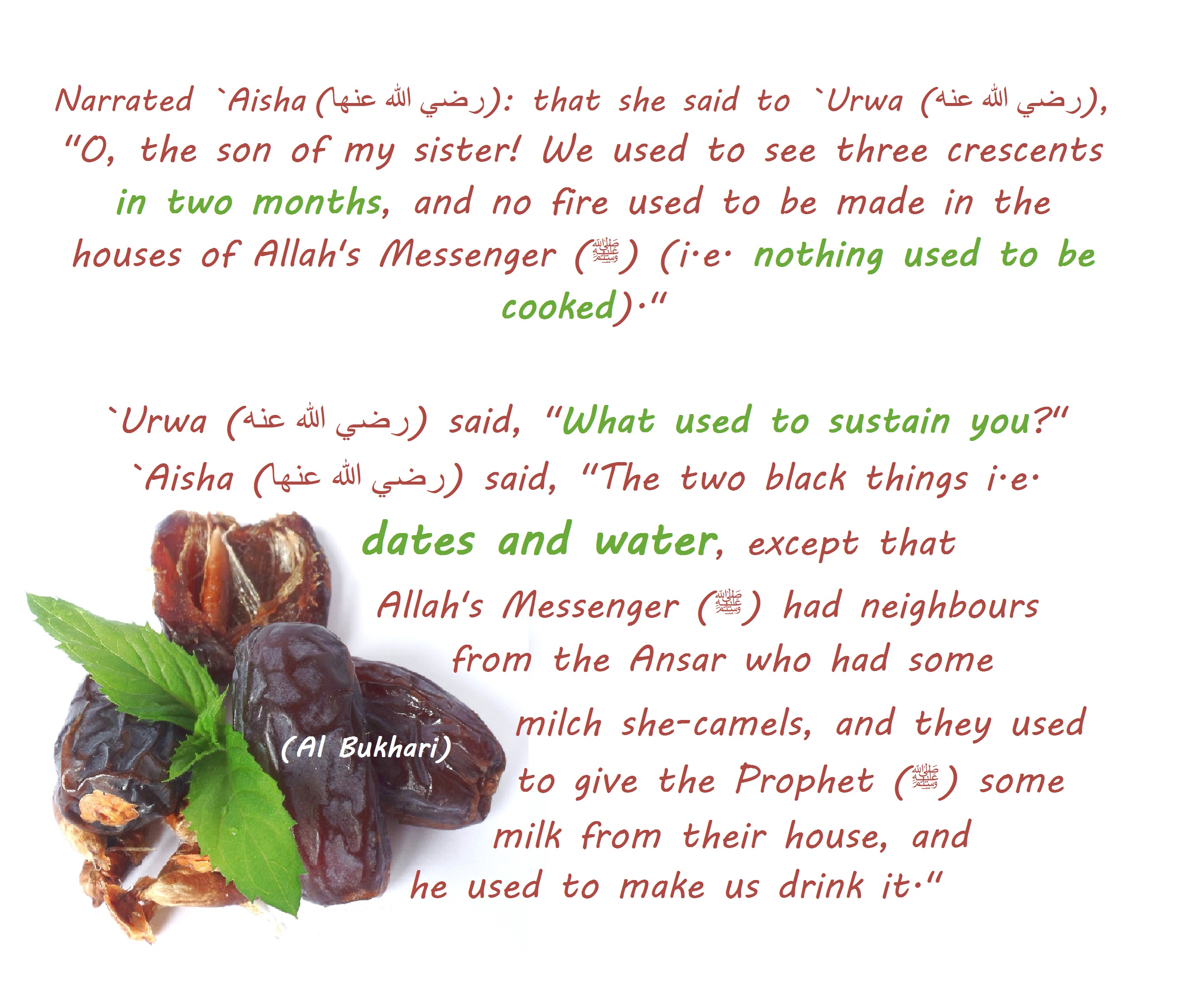 We should turn around and look at our pantry. Subhan Allah. Indeed, the favours of our Lord on us are infinite. One healthy pot meal/stew is adequate for suhoor and iftar.
We should turn around and look at our pantry. Subhan Allah. Indeed, the favours of our Lord on us are infinite. One healthy pot meal/stew is adequate for suhoor and iftar.
When there is too much food to choose from, salads and a few other dishes are always neglected. Avoid making dishes which are not preferred by family just for the sake of filling the table. We don’t need an Instagram perfect table. If we really want children and other family members to eat traditional dishes, don’t prepare fancy items when you serve them. If we really want children and other family members to eat traditional dishes, don’t prepare fancy items when you serve them.
Eat together. Share food.
Some of us are accustomed to eating many different dishes for iftar and can’t compromise on it. Every member of the family decorates his/her plate with a variety of food. Sadly, not all of us bother to finish our plate. No one wants to eat the leftovers from others plate! Why not? Didn’t prophet Muhammed (ﷺ) take a bite from where Aisha (رضي الله عنها) ate the meat. He even used to drink from the exact spot where Aisha’s (رضي الله عنها lips touched the vessel.

As a family try to eat from the same plate. At least avoid individual plates for side dishes. Don’t hesitate to eat the food left by your child or spouse. Encourage children to finish partly eaten leftover food from their sibling’s plate before reaching for another serving. This would also increase love for another.
Parties: Let the guests help themselves
Indeed, for every person that we help breakfast, we will be rewarded. I used to love inviting friends for iftar. As the years passed and my responsibilities increased, I found inviting others for iftar stressful. It takes me at least two days to prepare for the huge iftar. A day after the party is also spent cleaning and arranging. A simple meal wouldn’t please all. I started wondering what were my intentions behind such parties? I feel it is better for me to spend more time with the Quran than be stressing over a party. It’s really up to you decide if you want to call people over for iftar. Check your intentions. Let the guests help themselves with the food to prevent food wastage. Learn if any organization could collect leftover food for charity. In case there is plenty of food left notify them.
Instead of iftar parties, I prefer sending food to neighbours and friends who stay close by. I send something which is easy to cook and serve. I don’t have to worry about the leftovers, arranging the table and cleaning up. You may also send food to the masjid. But see to it that the food is to the liking of the people who receive it. Or, you may sponsor iftar to those in need. Several organizations let us purchase tickets to offer iftar for those in refugee camps or work as laborers.
On being invited, avoid overloading your plate. Your dear friend (the host) may keep killing your plate. Explain to her politely that you can’t eat more. If she keeps insisting that you eat more, request him/her to pack the delicacies so that you can eat later.
Sudden Guests: You can manage with what you have!
Sometimes, some friends may drop by during iftar. Insha Allah, the food will be adequate for all.
Kanchi (A porridge made of rice and pulses) is a must-have meal at my home during iftar. When someone joins me for iftar, I simply add more homemade broth (if I have it in my freezer) or water to the porridge. Then I thicken it with rolled oats or couscous or millets or anything which cooks within 5 minutes without looking distinct.
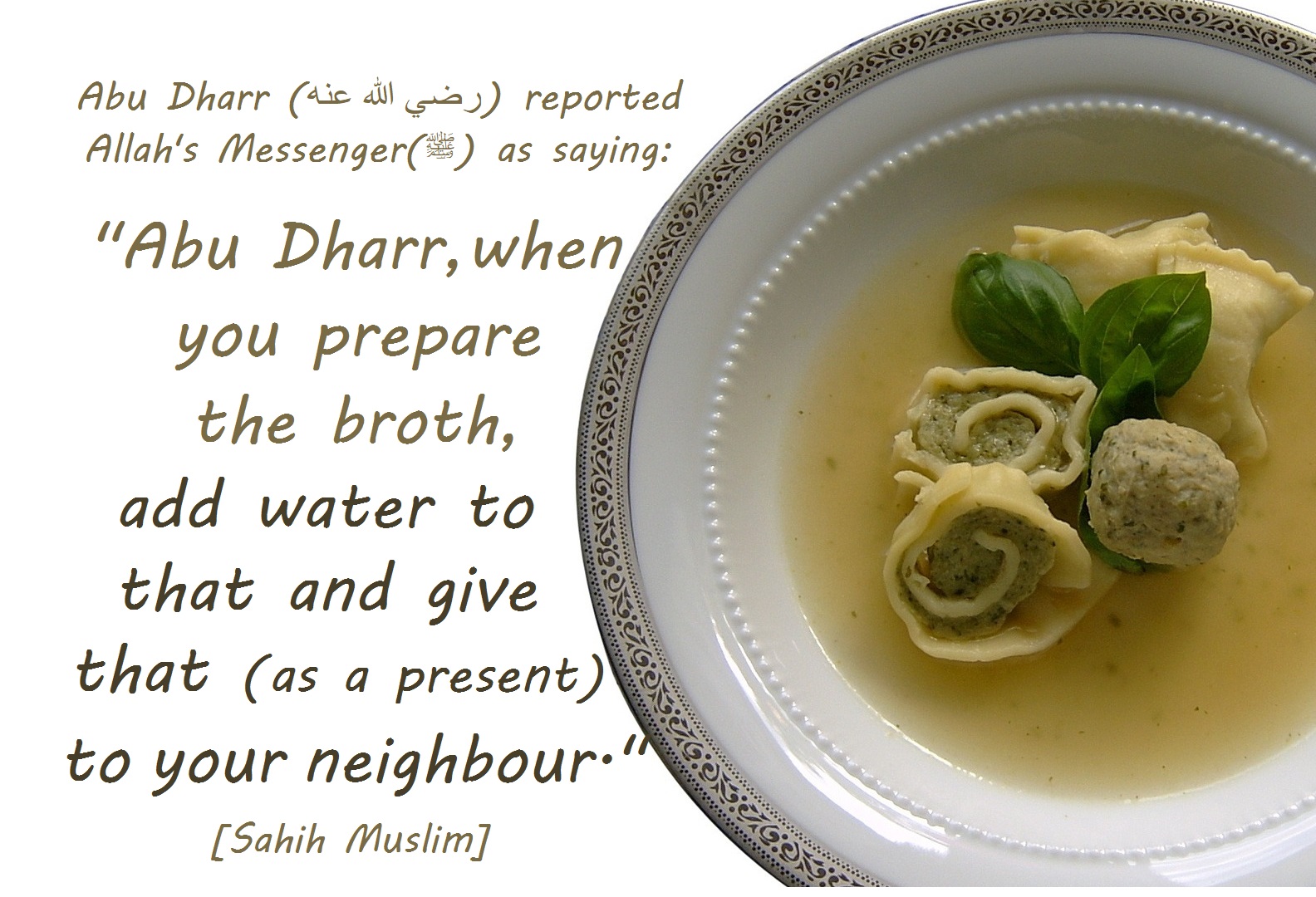
If the time permits, I cook one more variety of snack (sandwich/ bread roll). If not, I just avoid eating snacks that day. I serve desserts in fancy dishes to make the guests feel special. It almost always works great.
Buffet: If you pick it, eat it.
Iftar buffet! Non-Muslims and Muslims look forward to trying this from some of the best hotels! Remember not to overeat. Yes! You have paid a huge amount for the buffet, still, don’t overload your plate.
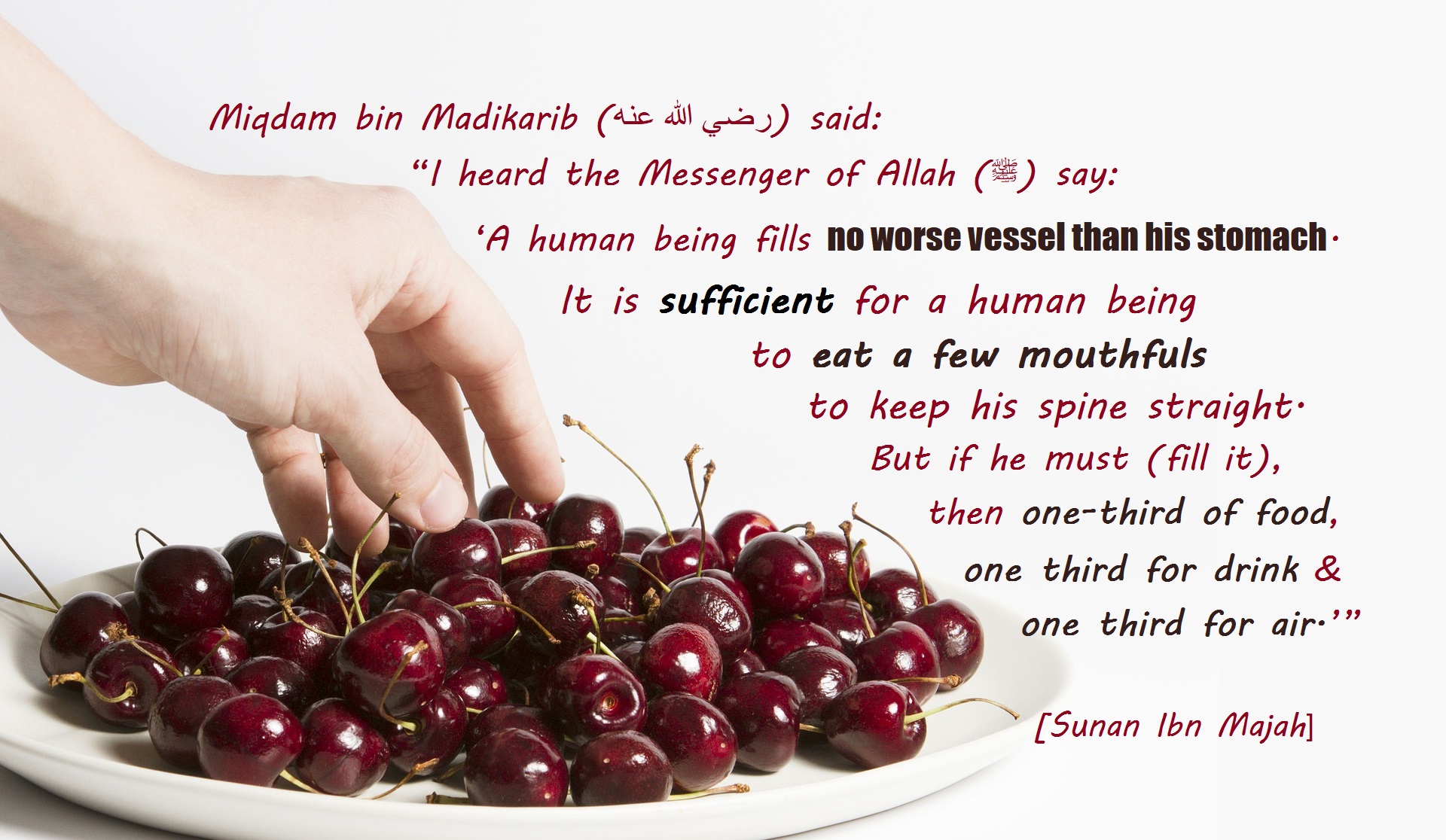
Take only as much as you need. You can always go back for a second serving. Don’t stuff yourself. This will have an effect on your prayers. If you can’t resist stuffing yourself at a buffet, avoid it. Instead of participating in buffet just order your favourite food.
Excess food (which is received as gift) – What can be done with it?
My generous neighbours send us more food than we can eat in a week! The yummy food gives us a glimpse of their taste and culture. I immediately send some of it to my friends (They love the pasta made by my neighbour). Even companions used to regift the gifts they received.
After eating to our fill, I convert leftover food to something which we are much more used to eating. For instance, I strain the tomato soup, add spices to the strained soup and cook rice or pasta in it. I use the strained veggies and meat as stuffing in samosa.
Breaking fast at masjid:
Some Masajid offer far more than one can eat. It is impossible to complete eating food before it’s time to establish the prayer. Pass the food which you haven’t eaten to someone else who needs it. If there are different sealed food items don’t open all of them. Complete eating a snack before opening the next sealed dish. See to it that the sealed food items are not thrown in the trash.
Dealing with fussy children:
During Iftar, it’s most likely that children may pick much more than they could eat. I ask my son to throw leftover food all by himself or eat it later. My son is old enough to understand that he is answerable for the food that he throws. He always opts to eat it later.
Dealing with the leftovers:
All of us wise enough to make most of our resources. In spite of our best efforts, we may have to deal with leftovers. Here are some of the things I do: I wash the dressing of the left-over salad and use it in soups. Leftover meat is used as stuffing in sandwiches or roles. I freeze the extra chutney or gravy. Use it a few days later. This would also give much-needed break from cooking.
Our taste for food could vary. I am sure you have a list of things to turn your leftovers into yummy delights. Please leave the tips in the comment section.
————–
Watching the documentary of refugees in refugee camps is heartbreaking. When they described their earlier life, they told they were happy with plenty to eat! They were leading a carefree life just like us. May Allah make it easy for them and solve their problems. And may He save us from such trials. Ameen. One of the children in the refugee camp was asked what he wanted to eat. Can you guess, what he replied? Ice cream? Chocolate? Pizza? He wanted “Bread”! He wanted plain bread – something which we throw without even giving a second thought. Remember, we will be asked about our blessings.
ثُمَّ لَتُسْأَلُنَّ يَوْمَئِذٍ عَنِ النَّعِيمِ
Then you will surely be asked that Day about pleasure. Quran (102:8)

We have plenty to eat to drink and we assume this is a sign that Allah loves us. Is that so?
Even Abdurrahman ibn Awf(رضي الله عنه), one of the ten men who was promised paradise feared that an extravagant meal would deprive him of bounties in the hereafter! Subhan Allah.
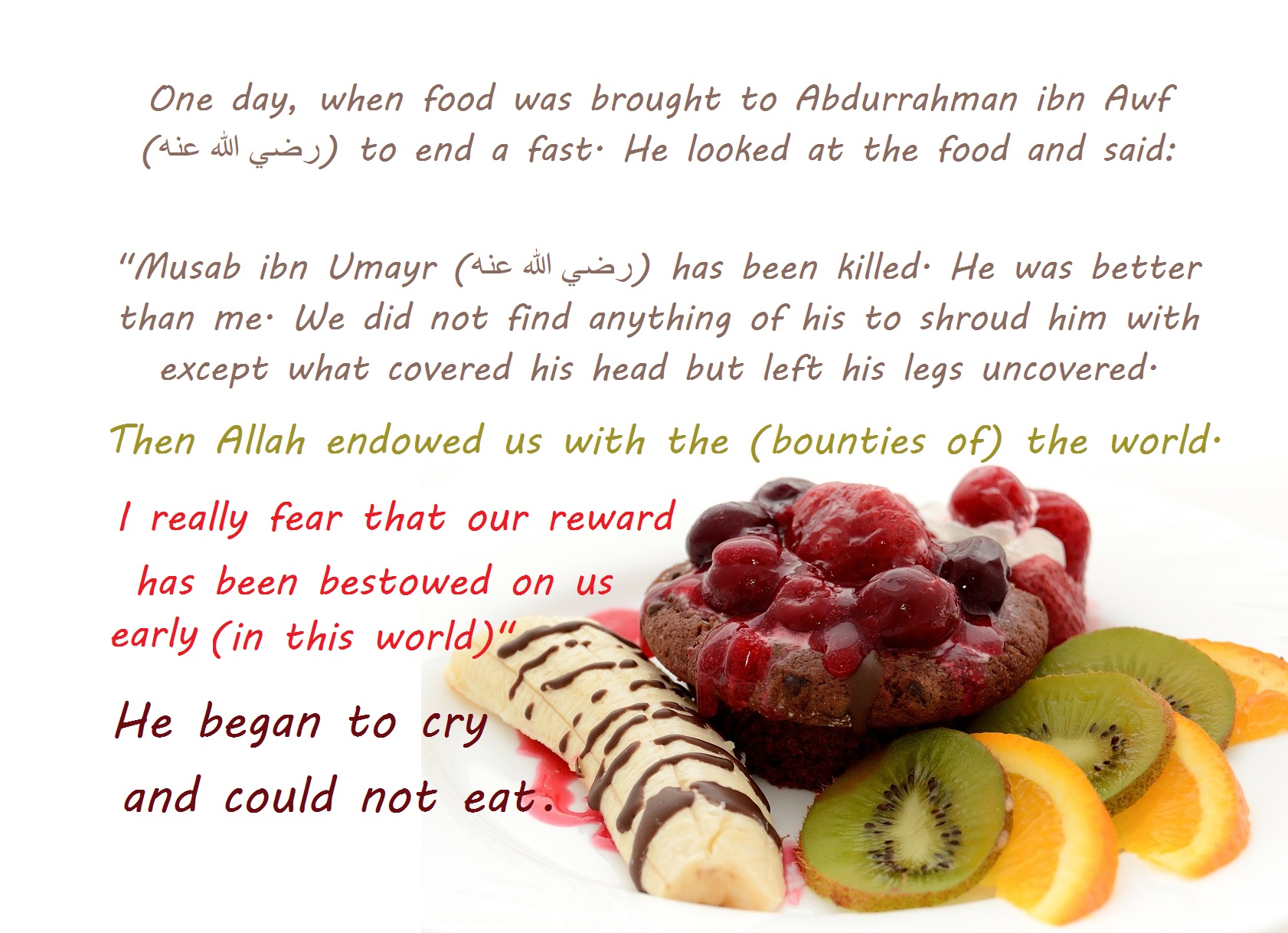
Do we remember our beloved prophet and his companions when we see our lavish iftar table? Would we give our cooks a break and be satisfied with a simple humble meal? Could we stop insisting on a different dish for each meal? Could we stop associating fasting with feasting? Will we stop throwing away good food into our bins?
Oh, Allah! forgive us of our shortcomings. Do not hold us accountable for the things we did unknowingly and help us be grateful to You. Help us be content with we have. Prevent us from being extravagant. Bless us with bounties in this world and in the hereafter. Ameen
رَبَّنَا آتِنَا فِي الدُّنْيَا حَسَنَةً، وَفِي الآخِرَةِ حَسَنَةً، وَقِنَا عَذَابَ النَّارِ
- The essence of Ramadan - April 22, 2021
- Day 9 Ramadan 2019 – From the Table to the Bin - May 13, 2019
- Honey Bee – Reflections from the Life of a Friend - March 27, 2019

